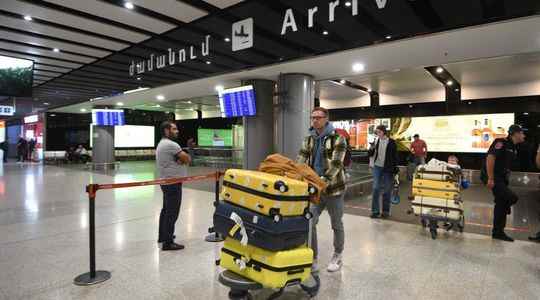“There are a lot of Russians in Armenia these days. In the center of Yerevan, it almost feels like Russia.” The observation of this resident of the Armenian capital summarizes well the recent upheaval of migratory flows towards this former Soviet republic of 3 million inhabitants, nestled in the heart of the Caucasus. Thanks to the visa exemption they enjoy, many Russians have found refuge there since the start of the war in Ukraine. “Like many of my compatriots, I came here because I didn’t want to be mobilized,” immediately confirms Andrei, 37, who arrived in the country in early November. His decision was not difficult to make. “If I stayed in Russia, I had the choice between the army or prison,” points out this computer engineer, who previously worked in Moscow.
Despite the explosion in the price of plane tickets – some could reach more than 9,000 dollars after the announcement of a mobilization of 300,000 men by Vladimir Putin on September 21 – Andrei managed to find a flight to the Egypt, before heading for Yerevan a week later. “I was nervous, because in Moscow the police could catch you in the middle of the street and send you to the army recruitment centers”, explains the 30-year-old. Earlier in the year, he had already been arrested by the police during a rally against the war in Ukraine.
An opportunity for Yerevan
The motivations of Serj*, 30, were hardly different when he left. “This war is a real tragedy, it was out of the question that I was sent to kill people in Ukraine”, testifies this entrepreneur in the catering sector. “All my friends are against this war, there is not one who supports it, he assures. And not only my friends who have gone abroad: those who have remained in Russia too. don’t have the financial capacity to leave the country, but that doesn’t mean they are in favor of invading Ukraine.”
However, Serj has no illusions about the reality of support for this war in a whole section of Russian society. “Russia is a big country, and in many small towns and villages access to education is more restricted than in big cities. The main source of information, especially for older generations, remains television that relays Putin’s propaganda 24 hours a day. It inevitably ends up having an effect on people”. For the future, Serj would see himself joining Europe, North America, or Asia. “But certainly not Russia, now is no longer the time to live there, he decides. Like many, I did not choose Putin, nor this regime. I wanted to create my business and contribute to making Russia a better and more attractive country, not that it becomes hostile as it is today…”
In the first six months of the year alone, more than 370,000 Russian citizens poured into Armenia according to the Armenian Immigration Service, more than double the figure recorded in the same period of 2021. The new wave departure at the end of September would have added nearly 80,000. “These are mainly young executives working in the IT sector”, evokes an Armenian diplomatic source, for whom this arrival of qualified labor a development opportunity. In fact, at the beginning of October, the World Bank revised its growth forecast to 7% for Armenia in 2022, against 3.5% initially forecast.
“Putin’s policy is leading us straight into the wall”
“Putin is a murderer: as long as he is in place, I categorically exclude returning,” insists Karen, a Russian in his twenties from the Chelyabinsk region, not far from Kazakhstan. And the hypothesis of a dismissal of the head of the Kremlin will not be enough to make him change his mind: “I will wait to see who replaces him, because his entire government is corrupt, so there is no guarantee that his successor will not be not even worse.” His decision to leave, he made it after several months of agonizing over the prospect of being sent to the front. “I have health problems, but the army recruitment center didn’t care, he says. When the mobilization was announced, I understood that there was no no chance of me escaping it.”
In Russia, he describes an atmosphere that has become suffocating, and the omerta imposed by the regime on the subject of the conflict. “When one day, at work, I spoke of the war, my colleagues immediately told me to be careful, because the power imposes to speak only of a ‘special military operation’, recalls this former manager. Many people who spoke out against this war were later accused of being foreign agents.” An infamous designation requiring any person concerned to submit to heavy administrative constraints, under penalty of a fine or even imprisonment.
Alexei, a 31-year-old computer developer present in Armenia since the spring, has also chosen not to return to Russia anytime soon. “Initially, I didn’t want to leave my country for too long, because my parents are a bit old and I wanted to be able to come back to them. But when the mobilization started, the risk of returning to Russia became too great. ” If after a few months there, the young man from Nizhni-Novgorod ended up finding his marks in the Armenian capital, he bitterly regrets the direction taken by his country in recent years. “Putin’s policy leads us straight into the wall , he laments. Repression and war can only accelerate this process.” However, the thirty-year-old wants to believe that he will one day be able to return to his family. “Russia remains my country, and I would like to be able to return there, he sighs. But it may take years…”
* The first name has been changed
